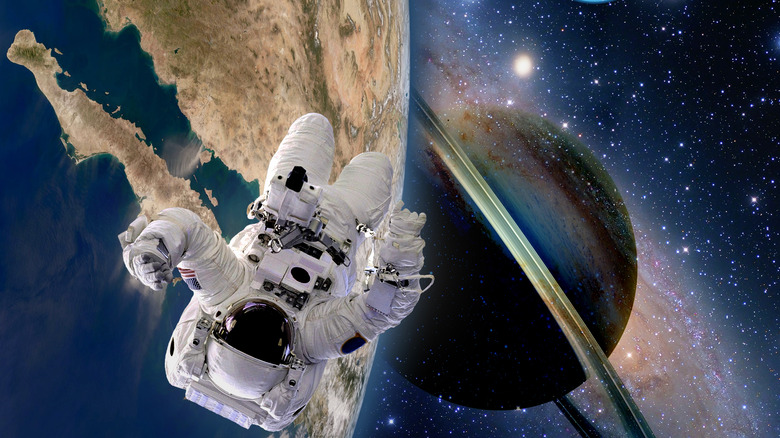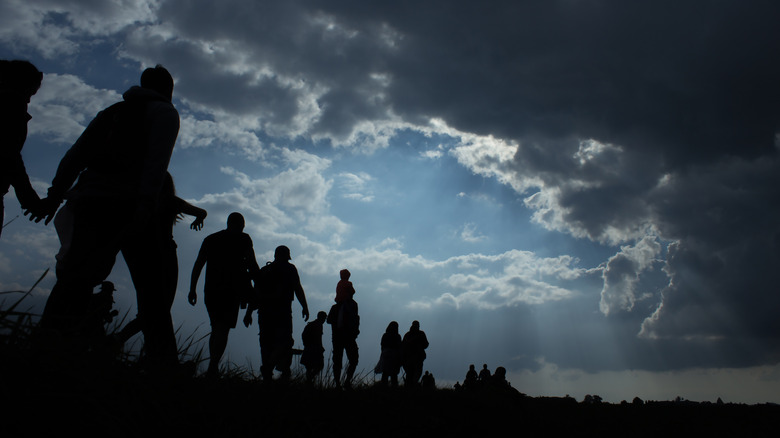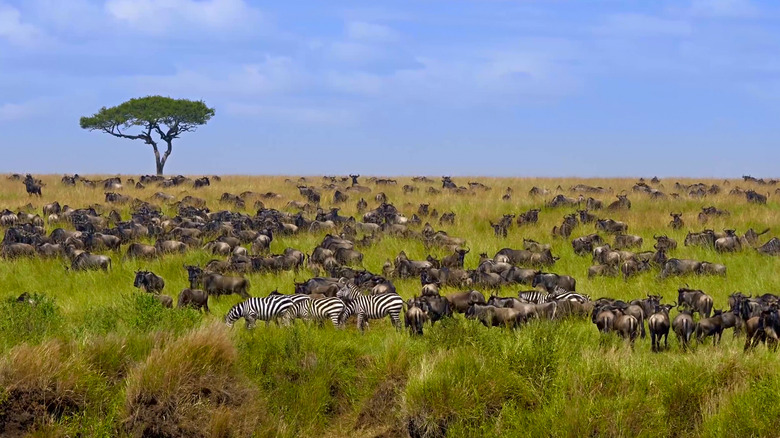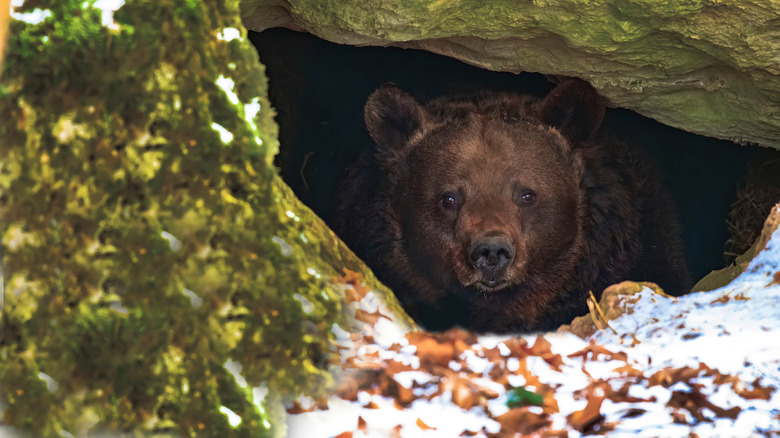Here's What Would Happen If The Earth Wasn't Tilted
As the final heatwaves of summer make their way into the air, the longing for autumn has already hit. The world is preparing to ditch the sunscreen and cozy up in plaid blankets with piping cups of cider. When we think of fall, our minds tend to gravitate to pumpkin spice lattes and colorful leaves. We associate the season with crisp breezes, apple orchards, infinity scarves, and new beginnings. We couldn't be more wrong.
In truth, autumn, along with winter, summer, and spring, is the product of something much more fascinating and complex than sweater dresses and seasonal spice. Seasons happen because our planet is tilted ever so slightly, at an angle of approximately 23.5 degrees (via Business Insider). Like many of Earth's planetary functions, this tiny tilt is made possible through the participation of nearby cosmic entities. In this case, it is the moon that plays a pivotal role.
Were it not for the gravitational pull of Earth's moon, our planet's shift would be of much greater proportions. Standing up would likely make you nauseous. The sun would shine 24 hours a day, seven days a week (via Business Insider). But what would happen if the opposite occurred, and earth wasn't tilted at all?
If the Earth wasn't tilted, seasons would not exist
Seasons, as we know them now, are the result of our planet's obliquity, that slight tilt so seemingly insignificant that we're unaware of it while walking around. Earth Sky reports that when this obliquity decreases, shifts in season become more moderate. If our planet were completely perpendicular, we would, in effect, live in a world without seasons.
This means no summer slushies, no winter skiing. It means that fresh bloom of spring and that crisp, cool feeling of fall would be completely absent. Compared to other imaginable cosmic scenarios, this change appears minor at first glance. But a world without seasons changes everything — from the way we build houses to our process for growing food. Live Science reports that seasons influence our internal clocks, having a profound impact on our biology and on the internal makeup of the other animals and creatures around us. Picture, if you will, a dull, season-less planet where just about everything's out of whack. That's what you get if you shift Earth's axis a measly 23.5 degrees in a different direction.
In a world without seasons, humans could, theoretically, survive
So many doomsday scenarios wipe humanity off the face of the planet before things have time to really get interesting. Not so in a world where seasons cease to exist. In such a space and time, humanity can theoretically survive, although the Evolution of Everything suggests on its YouTube channel that population density would have to be significantly lower.
The reason for the thinning out of humanity as opposed to an altogether obliteration is simple. Much of the planet would be covered in ice, exhibiting an uninhabitable arctic region that would envelop most of the globe. This would force humankind to convene in the small space surrounding the equator, which would likely still have a tropical climate. This poses a perilous predicament because it offsets the need for mass human migration.
Human beings fortunate enough to successfully migrate to the somewhat comfortable region along the equator would still have to battle it out for more space. To put things into perspective, in a season-less world, 100% of human beings would need to find a way to consolidate themselves into 40% of the current available space on Earth (per Science Mag). To add to the peril, they would not be alone in this plight.
Animals would likely have to migrate en masse, too
Science Made Simple explains that migration is a natural animal adaptation to inclement weather, particularly cold weather. As such, we would have to assume that if most of the planet were covered in ice, mass animal migrations would have to take place. The only alternative would be extinction.
If, by mass animal migration, you're picturing stampedes of elephants, swarms of bees and butterflies, shifty foxes, and slithering snakes all racing against each other for a plot of the only available land left, you've got a pretty good idea of what would be happening at your feet. However, lest not we forget that a whole other world exists beneath us.
According to Scientific American, marine mammals avoid icy deaths by — you guessed it — migrating to warmer waters. This means the mass migration of toothy sea creatures and translucent cave critters. It means crustaceans and crocodiles, fighting for space against glow-in-the-dark sharks and color-changing octopuses. It means a drastic change occurring in the ocean below us, of which we already know so little.
Cities could no longer exist
Since plants are rooted deep in soil and unable to migrate, those plants trapped in colder climates would be forced to shrivel underground, clutching their own dead leaves for insulation (via National Snow and Ice Data Center). How long they could survive this remains unknown. The bigger question here is, how long could the rest of Earth's wildlife survive without the help of these plants? Starvation and food scarcity would most certainly top the list of problems, which already include overcrowded spaces and the need to avoid elephant stampedes.
The Evolution of Everything helpfully points out that with a touch of creativity, humanity could make it work. To do so, humans would have to reside in smaller settlements, which means no more cities. Cities contribute to more than 80% of the global GDP (via McKinsey & Company), so that seemingly mighty dollar in your pocket would instantaneously become meaningless. A season-less world means a complete economic collapse, harkening back to ancient, perhaps even prehistoric, times.
All internal clocks would turn off, causing wonky breeding and hibernation patterns
The unique position of Earth is known to affect biology, with this aspect scientifically referred to as an internal clock or a biological clock. Many animals rely on this internal clock to tell them when to give birth. For creatures that fit this description, the survival of their young is heavily rooted in the perfect timing their internal clock provides (via Live Science). If animal reproduction were to go off-kilter, it could mean overpopulation of some species and utter extinction of others.
Proceedings of the National Academy of Sciences explains how seasons affect survival in hibernating mammals. When you apply this same premise to a world with no seasons at all, it becomes clear that hibernating mammals might never awaken from their slumber. Alternatively, they could wake up at the wrong time or in the wrong region of this newly altered Earth landscape.
As you can see, a perpendicular Earth is not quite so straight after all. If Earth were not tilted, everything about our planet would suddenly and irreparably change. And to think, this life-altering apocalypse is just a few tiny degrees away.





